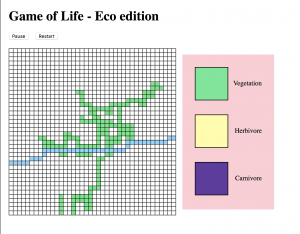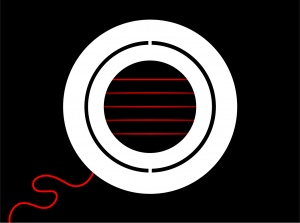Sid Chou
A Cellular automaton for the ecosystem.
https://sidchoublog.wordpress.com/2018/11/13/icm-week-9/
Description
The cellular automaton I’m creating, different from the well known Conway’s Game of Life, it models the entire ecosystem. On the canvas, the following categories of species are modeled, vegetation, herbivore, carnivore, in addition of a landscape element, river.
A new world will be generated every time the game start with river and vegetation. The player plays as a “God”, which they place species of herbivore and carnivore on the field. After amount of time, “human” will be introduced into the world, and start consuming the resource. When the resource was out, the cell will turn gray and be in the permanent dead state, while all the resources are used out, it is game over.
The player can strategically place carnivor to fight and human on the canvas; however, carnivores consume herbivor, and herbivore consume vegetation, so it also use up resource on its own. The goal is find a good balance to sustain the game as long as possible without using up the resource.
The game most likely to end up all the resource being used, it is intend to be almost impossible to achieve equilibrium which is meant to make the user consider about our impact to the environment.
Classes
Introduction to Computational Media



